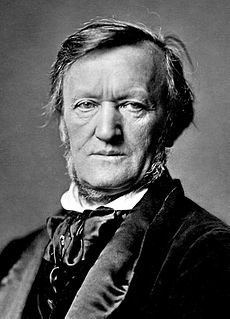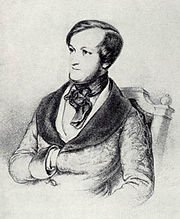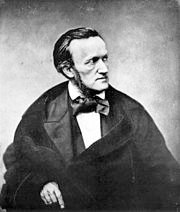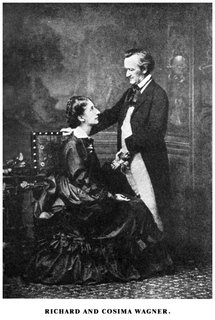10 Of Wagner's Compositions in Honor of His Birthday
8 days ago was Richard Wagner's 204th birthday. Wagner was one of the most influential Romantic composers, and changed the course of opera. Wagner expanded the Opera into something as big as a Shakespearean drama. At the same time, Wagner was very narcissistic. One conductor (I have no idea who)(My theory teacher told me this) once said "If I met Wagner, I would punch him in the face, but his music was very good." Anyway, in this article I will give a list of 10 of Wagner's compositions. But first, here's a little bit about Wagner:

The Life of Wagner
Wilhem Richard Wagner was born on May 22nd, 1813 in Leipzig Germany. Wagner was the 9th child to an ethnic German family. Six months after Wagner's birth, his father, Carl Wagner, would die of typhus. At that point, Wagner's mother would stay with her husband's friend, actor, and playwright, Ludwig Geyer. In 1814, Wagner's mother would marry Geyer (there is no documentation to prove this, but it is speculated), and move to Dresden. Until he was 14, Wagner would call himself Wilhelm Richard Geyer, almost certainly believing that Geyer was his biological father.

Geyer's passion for the theatre, would rub off on a young Wagner. Geyer would die when Wagner was 8, and at the age of 9, Wagner would write his first play, Leubald. This play was strongly influenced by plays by William Shakespeare and Johann Wolfgang Van Goethe. Wagner was determined to set Leubald to music, and persuaded his family to pay for music lessons.
Wagner had studied piano in the late 1820's, and could barely play a scale. In 1827, Wagner and his family would return to Leipzig, where Wagner would begin his first lessons in harmony from 1828 to 1831. It was in 1828, that Wagner first heard Beethoven's 7th Symphony and Beethoven's 9th Symphony.

Beethoven would inspire Wagner to become a composer. When Wagner saw Drama Soprano, Wilhelmine Schröder-Devrient, he decided that he would merge drama and music.
At the age of 20, Wagner composed his first complete Opera, Die Feen (The Fairies). This work would not premiere until after the composer's death in 1883. His next opera, Das Liebesverbot (The Ban on Love), would close by the second performance leaving the composer bankrupt. At this point, Wagner began to fall for one of the leading women, Christine Wilhelmine "Minna" Planer. In 1836, the two would get married. After an affair in 1837, Wagner and his wife would get back together, and move to Riga, in the Russian Empire. By 1839, they would flee to London due to debt. The stormy sea passage to London would give Wagner the inspiration to write his next opera Der fliegende Holländer (The Flying Dutchman).

Eventually, Wagner would move to Dresden and be appointed the Royal Saxon Court Conductor. Wagner's left-wing (socialist views) would end his welcome in Dresden. An arrest warrant would be issued due to Wagner's minor participation in a rebellion, this would cause Wagner to flee.
Wagner first fled in exile to Switzerland from 1849 to 1858. Here, Wagner had no personal income, and felt isolated from the German musical world. From 1850 to 1859, Wagner's friend (Karl Ritter)'s wife, Julie, would pay him a small pension to live off of. It was around this time that Wagner published his first article about his antisemitic called "Judaism in Music." In this, Wagner spoke of how he felt that Jews had no connection to the German spirit, and therefore only produced shallow and artificial music in the hopes of success, rather than to make beautiful music. Later on, Hitler would use Wagner's views and his music, to propagandize his followers.

After a discovered affair, Wagner would move in exile to both Venice and Paris. Here, he would continue to work on his Dramas, until he moved back to Germany in 1862. In Germany, he would become friends with King Ludwig II, the young king who had recently taken the thrown. King Ludwig II settled all of Wagner's financial debts, and offered to put on many of the dramas Wagner could not get performed (due to the belief that they were not singable).
Wagner would die of a heart attack in 1883 on a trip to Venice in the winter. He died on February 13th, 1883.
10 Compositions
Here are 10 of Wagner's compositions.
10. Tristan und Isolde (Prelude)
Though this piece isn't super loud, it can be very intense. It has its powerful moments, and its tender moments. I could imagine this opera being a love tragedy like Romeo and Juliet. Considering that Wagner wrote a lot of operas, this list will probably have a lot of overtures/preludes.
9. Tannhäuser Overture
This piece sounds like a chorale in the beginning. But, as this piece develops, it grows. The strings begin to play a theme, and the brass becomes melodic, creating an energetic theme. Until the them becomes more sentimental when Wagner excludes the brass, and uses only the strings. Then, Wagner creates a rather playful theme that goes back to a quiet strings theme. Until later on, he brings the brass back and crescendos.
8. Götterdämmerung, Siegfried's Funeral March
Wagner seems to be very good at building suspense. The beginning of this piece is practically a whisper, until it grows into a moan, and eventually into a shout. It sounds quite similar to Chopin's rather famous Funeral March from his piano sonata in B-flat Minor.
7. Das Rheingold Prelude
This is from the opera Die Walküre, which also contains Ride of the Valkyries. This is the music of the entry of the gods into Valhalla. It is actually quite beautiful! It is both triumphant, and sentimental. I will make a point to say that Wagner really seems to understand instrumentation. He knows which instruments to use for which kinds of sounds.
6. Lohengrin (Prelude to Act III)
When I first discovered this, I didn't realize that it was the insanely popular song from weddings "Here comes the Bride!" This is up there with Mendelssohn's Wedding March. I had no idea that Wagner had written this piece!
5. Tannhäuser (Grand March)
I enjoy how playful the Trumpet part in the beginning of this piece is. Then, it leads into a rather serious chorale which eventually leads back to playfulness with the woodwinds. I also again notice in this piece, Wagner's skill with instrumentation. He not only uses different instruments for different sounds, but he figures out how to incorporate different instruments into sounds you wouldn't usually hear them in (playful trumpets).
4. The Mastersingers of Nuremberg (Overture)
This piece is very uplifting! It sounds rather similar to the 4th movement of Beethoven's 5th Symphony at times. It is energetic, and, for whatever reason, makes me think of The Wizard of Oz.
3. The Flying Dutchman (Overture)
I did a little research on the flying Dutchman (I don't think SpongeBob gave the full story). Apparently, The Flying Dutchman is a ship from a nautical legend. This ship is forever forced to sail due to the inability to harbor in a storm near Africa. Apparently, if seen, the crew of the flying Dutchman will try to send messages to people long dead on land. Good to know that Wagner knew his nautical legends. This piece does sound very pirate-y.
2. Wagner Fire Music
My mother would have killed me if I had not included included Wagner's Fire Music. I have never really listened to it, but she likes it, so I included it. It actually sounds quite beautiful. By the title, I assumed it would be hellish, but it is actually pretty beautiful.
1. Ride of the Valkyries
This is probably one of Wagner's most famous pieces. It was used as the soundtrack for Apocalypse Five. The strings really build up suspense in the beginning of this piece until the French horns come and completely develop the main (epic) theme. From then on, the theme is all about the brass. Wagner really knows how to make an entrance, and end on a bang! According to Wikipedia, a Valkyrie is a female figure that decides which men die in battle, and which ones live. The Valkyries then bring those who they chose to die a glorious death to the Hall of the Slain, or Valhalla, ruled by the god Odin. This particular piece comes from Wagner's Opera, Die Walküre. Here is Ride of the Valkyries:
Sources
** Information **
Wikipedia (Wagner)
Wikipedia (Valkyries)
Wikipedia (Flying Dutchman)
** Photos **
Wikipedia
Previous Composer Birthdays (In order by how recent it was)
5/22 - Richard Wagner
5/12 - Gabriel Fauré
5/7 - Johannes Brahms
5/7 - Pyotr Ilyich Tchaikovsky
4/1 - Sergei Rachmaninoff
3/21 - Johann Sebastian Bach
3/4 - Antonio Vivaldi
3/1 - Frédérick Chopin
2/28 (29) - Gioachino Rossini
2/3 - Felix Mendelssohn
1/31 - Franz Schubert
1/27 - Wolfgang (Amadeus) Mozart
The Next Birthday will be Robert Schumann on June 8th.
Thanks for reading this! It was interesting to learn so much about Wagner. I'm sorry this is late, I am a very good procrastinator. Please remember to leave feedback and check back later!

Also remember to check for: My weekly 7 post, As Well As My Composer Birthday Posts
Make sure to check out my minecraft server themed on Steem. Ip is steemcraft.mcph.co!!
By the way, thanks for yet another full article on an interesting topic. I've been away for a while but I remember your writing and wanted to let you know I appreciate the work you put into it. I've included it in my daily index.
Thanks! @baerdric
Outstanding post and narrative! ☆☆☆☆☆😎